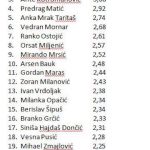Mozemo! MP Sandra Benčić told a news conference in Osijek that the purpose of the provision of the Gender Equality Act under which a slate must contain at least 40% of candidates of the underrepresented gender is to increase women’s participation in politics.
She said the law in question defined the gender that accounts for less than 40% of members of representative bodies as the underrepresented gender, and in order to apply the measure that gives an advantage to a certain gender, the gender in question must be underrepresented in the bodies for which it runs.
This is one of the few laws that has defined its concrete goal, and that is to have 52% of women in bodies of political representation in three election cycles, which is the share of women in the general population. Three election cycles have passed since the law entered into force, and not only are we not even close to that goal, we are almost where we used to be, Benčić warned.
She believes that men are not underrepresented in representative bodies because slightly more than 20% of MPs are women while women account for less than 20% of the Osijek City Council, and the situation is similar across the country, with women continuing to be significantly underrepresented in bodies of political representation.
Benčić called this “a classic absurdity of our judiciary” where a norm is used contrary to its intended purpose, and she expressed hope the Osijek Municipal Court would dismiss the report.
She said that her party would put forward changes to the Gender Equality Act to ask that the term ‘underrepresented gender’ refer to the gender that is underrepresented in a body of political representation and not to a slate.
She added that the party was prepared to take the case to the Constitutional Court and the European Court of Justice.
Mozemo! considers the case exceptionally important for the interpretation of real equality. Real equality cannot be viewed only as a form. Instead, the real result of a certain norm needs to be considered, that is, whether or not we have achieved better representation of women in political bodies, Benčić said in Osijek after the first hearing in the case.










